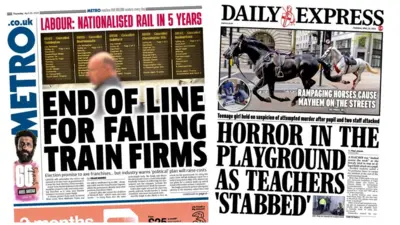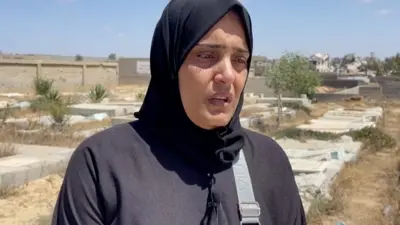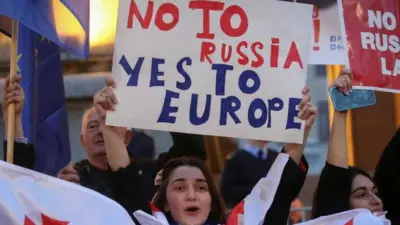We've updated our Privacy and Cookies Policy
We've made some important changes to our Privacy and Cookies Policy and we want you to know what this means for you and your data.
Young children identify with political symbols - research
- By Robbie Meredith
- BBC News NI Education Correspondent
Children in Northern Ireland begin to identify with religious and political symbols from as early as the age of five, according to research.
The Queen's University Belfast (QUB) study included children aged five to 11 from Northern Ireland.
Researchers concluded that despite peace agreements "tensions remain".
It added that children are "socialised in the history of intergroup conflict" from a young age. The study has been published in Developmental Psychology.
Ethnic categories
The research involved 299 pupils from six NI primary schools and more than 400 children from Kosovo and Macedonia.
It was carried out by academics from the School of Psychology at QUB, University College Dublin (UCD) and universities in the USA and Macedonia.
They studied how children's awareness of ethnic categories and identities emerged.
"Growing up in a setting of intergroup conflict shapes children's development," the paper found.
It also reported that in the wake of conflict, children's identities were shaped by symbols as well as families, communities and schools.
Divided education systems
The researchers chose Northern Ireland, Kosovo and Macedonia because all have experienced conflict and all have "divided education systems".
"That is, children are taught separately by ethno-religious background, typically in different schools," they concluded.
In Northern Ireland, most children go to either a Catholic-maintained or a controlled school - though all schools can have pupils from a variety of backgrounds.
Three Catholic maintained and three controlled primary schools took part in the QUB study, though the schools are not identified.
Image source, Getty Images
The 299 pupils - about half of whom were from Catholic backgrounds and half from Protestant backgrounds - were then shown 19 pairs of images and asked to select which one they liked better.
The pairs of images were of things like flags, political leaders, sports or symbols like a poppy and a shamrock mainly associated with either a Protestant and Catholic background.
According to the research, the children in Northern Ireland mainly preferred images and symbols from their own background.
The children were also set a second task in which they could choose to give stickers to a fictional child from their own background or the 'other' background.
"Children who had a preference for symbols from their own group, shared less with a pupil from a 'conflict rival' background," the research found.
However, some children were willing to share stickers with the child from a different background.
The researchers said this showed some children wanted to share outside their 'group', which was "a positive sign and suggestive of future peacebuilding".
Image source, JeffGoulden/Getty Creative
The paper suggested that future research could look at whether pupils in integrated schools identified with symbols differently than pupils in Catholic-maintained or controlled schools.
It also said that primary school could be an important period to teach children about those from other backgrounds, as that could "foster long-term peace building across development in divided societies".
The research was funded by a number of organisations including Northern Ireland's Department for the Economy (DfE).
It was led by Dr Laura K Taylor, who is a Senior Lecturer in Psychology at QUB and Assistant Professor of Psychology at UCD.
Top Stories
Features & Analysis
Most read
Content is not available








